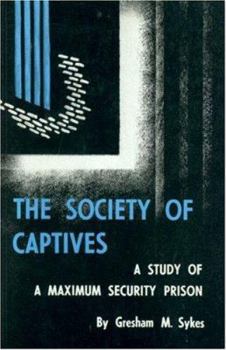Society of Captives: A Study of a Maximum Security Prison
Select Format
Select Condition 
Book Overview
Gresham Sykes wrote the book at the height of the Cold War, motivated by the world's experience of fascism and communism to study the closest thing to a totalitarian system in American life: a maximum security prison. The book is remarkably short--just 150 pages--but bristles with ideas. Sykes argued that many of the psychological effects of modern prison are even more brutal than the physical cruelties of the past. The trauma of being designated one of the very worst human beings in the world left prisoners with lifelong scars. It also inspired solidarity among prisoners and fierce resistance to authorities as strategies for rejecting those who rejected them. His analysis called into question whether prisons genuinely were, as many believed, "total institutions," where every facet of life was rigidly controlled. Sykes showed that the stronger the bonds among prisoners, the more difficult it was for prison guards to run the prisons without finding ways of "accommodating" the prisoners. The book set the stage for Michel Foucault's Discipline and Punish , among other works. Since it appeared in 1958, it has served society as an indispensable text in coming to terms with the nature of modern power.
Format:Paperback
Language:English
ISBN:0691028141
ISBN13:9780691028149
Release Date:February 1971
Publisher:Princeton University Press
Length:164 Pages
Weight:0.45 lbs.
Dimensions:0.4" x 5.4" x 8.5"
Customer Reviews
1 rating
Important Precursor to Goffman and Foucault
Published by Thriftbooks.com User , 21 years ago
No reviews for this book? Hard to believe given the number of used copies available. Surely many have read "Society of Captives"?Sykes uses the sociological framework of Talcott Parsons to analyze the "life of prison" in terms of its effects on the inmates. Sykes was obviously a key reference point for Goffman's work in "Asylums". Sykes works around the idea of describing a maximum security prison as a "total institution", but fails to really nail the concept down.He makes some interesting observations about the conflicting motives of guards on the front line of the prison. I found troubling his conclusion that the level of control sought to be imposed upon the prisoners was ever elusive. This seemed, to me, to be a justification for the behavior that goes on behind prison walls.His interesting discussion of prison riot and rebellion prefigures some of Foucault's analysis in "Discipline and Punish". In fact, I picked up my copy of Discipline and Punish immediately after (and during) reading this book and found the effect to be akin to a light bulb going on in my head.While Sykes lacks the conclusions of Foucault, his simplified analysis of the structure of prison makes reading Foucault's "Discipline and Punish" about 100% easier.Here is not the place for a more detailed comparison between the two books. None the less, any committed reader of Discipline and Punish should feel compelled to digest this book: After all, it only costs a buck and can be read in a single afternoon!





